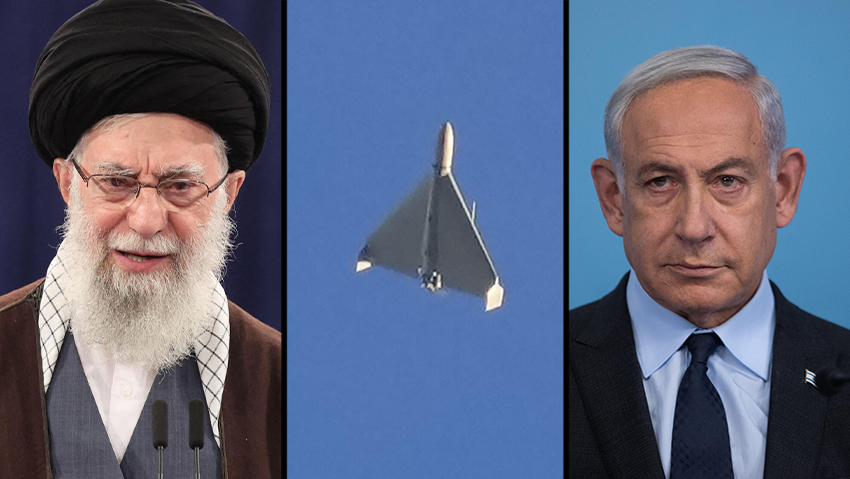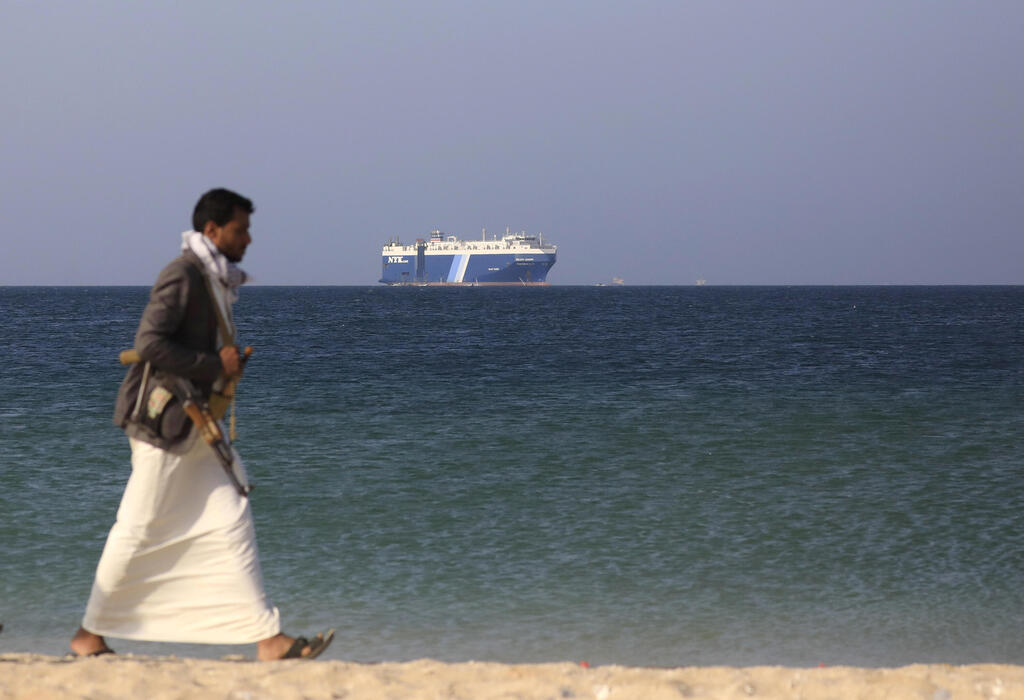Getting your Trinity Audio player ready...
The current state of affairs echoes the fraught atmosphere of the 1991 Gulf War, a time when Scud missiles were launched toward Israel by Iraq, primarily targeting the country's densely populated center. At the time, Israel prepared for chemical attacks, with gas masks distributed nationwide.
Fast forward to current times, the populace is preoccupied with locating the closest bomb shelters, fearing the impact of larger warheads compared to those Hamas had been launching since October 7. The Home Front Command directive to halt educational and extracurricular activities all across the country has only heightened the sense of anxiety.
3 View gallery


Iranian Supreme Leader Ayatollah Alu Khamenei and Prime Minister Benjamin Netanyahu
(Photo: AFP, Alex Kolomoisky, AP)
The question that looms over us, and primarily the Israeli government, is 'How long will this go on?' Iran, unique among the world's nations, repeatedly voices its intent to obliterate another sovereign state. Its actions, however, speak louder than its words.
Over the years, Iran has established itself as the vanguard of the so-called "axis of resistance," encircling Israel with the Houthis from the south and Hezbollah from the north and facilitating arms smuggling to Palestinians from the east. Without Iranian backing, Hamas wouldn't have been as proactive. Recent months saw the Hezbollah terrorist organization causing billions in damages and internally displacing tens of thousands of Israelis.
Israel's struggle to hinder Iran's acquisition of nuclear weapons has been in vain, indicating an escalating threat in the years to come. Iran is poised to become significantly more powerful. There's no need to anticipate a nuclear-armed Iran to recognize the damage already inflicted. A reservist was critically injured by an Iranian drone on Saturday. The southern maritime route is blocked and Eilat Port is almost entirely inoperative.
The strikes on arms transports via Syria haven't curtailed Hezbollah's ascendancy, and Israel is cautious about provoking a full-scale confrontation with Hezbollah, despite boasting a robust air defense array, for dealing with 150,000 missiles and rockets is an entirely different kettle of fish. A response from Israel might plunge Lebanon back to the Middle Ages, but the blow to Israel would be equally painful.
Despite the tense situation, Israel has yet to alter the status quo. Iran continues to make threats and launch attacks, while Israel lives in fear and responds minimally. But perhaps it's time for a shift in dynamics? Instead of Israel living in fear, could we turn the tables so that Iran feels threatened? Even if the nuclear facilities buried deep underground remain hard to target, there are other ways to cripple Iran, such as devastating their economy by targeting their oil fields.
Shouldn't we realize by now that threats left unaddressed for a decade only become more perilous over time? Ten years ago, a confrontation with Iran might have been necessary, but the fear is that a decade from now, such a confrontation could be considerably more difficult, if not impossible.
Instead of merely delaying the threat, perhaps we should leverage it to deal a significant blow to the Iranian regime. The global message that Israel is not to be trifled with has faded over time. Maybe it's time to reinforce that message. And not because Israel is seeking conflict, quite the contrary. But it might be more prudent to face a manageable crisis now than to risk an uncontrollable catastrophe in five or ten years.
Various groups such as Yemen's Houthis, pro-Iranian militias in Iraq, Lebanon's Hezbollah and Hamas from the Palestinian territories, don't pose an existential threat to Israel individually or even collectively. However, when Iran catalyzes these entities, the threat level escalates.
So, what's the course of action? To remain passive? To retaliate with weekly airstrikes in Syria? As long as these measures seemed to curb the threat, it made sense to evade a larger conflict. But that's no longer the case. Dodging confrontation may offer short-term peace but could result in a steep price in the long run.
In a different era, absent the extensive conflict we're currently witnessing, the notion of launching an offensive against Iran might have been deemed unthinkable. However, the present circumstances require a different perspective.
The United States has expressed its disapproval of Israel initiating an attack. Yet, in the current scenario, it's Iran that's openly threatening to attack Israel. This presents a ripe opportunity to establish a strategic alliance with the United States, as attempting to strike Iran without such coordination appears uncertain.
Is it possible to annihilate Iran? To put it mildly, based on several discussions with high-ranking officials who are likely in the know, the consensus leans toward affirmation. Israel still has some aces up its sleeve.
As long as Iran persists in intimidating Israel and instigating various terrorist factions, the crisis remains unresolved. With the incessant and intensifying threats, Israel's existence becomes increasingly untenable. This is a menace whose eradication is long overdue.





